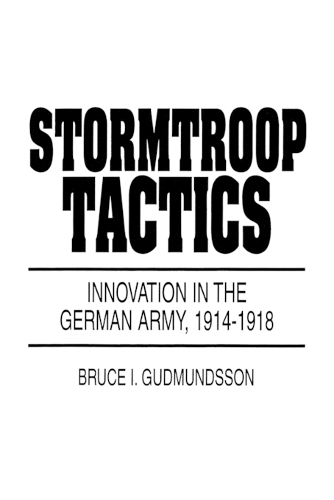
Stormtroop Tactics: Innovation in the German Army, 1914-1918
(Paperback)
Available Formats
Publishing Details
Stormtroop Tactics: Innovation in the German Army, 1914-1918
By (Author) Bruce I. Gudmundsson
Bloomsbury Publishing PLC
Praeger Publishers Inc
30th June 1995
United States
Classifications
Tertiary Education
Non Fiction
First World War
Land forces and warfare
Military and defence strategy
940.41343
Physical Properties
Paperback
232
Width 152mm, Height 229mm
340g
Description
Describing the radical transformation in German Infantry tactics that took place during World War I, this book presents a detailed account of the evolution of stromtroop tactics. It covers areas such as the German Infantry's tactical heritage, the squad's evolution as a tactical unit, the use of new weapons for close combat, the role of the elite assault units in the development of new tactics and detailed descriptions of offensive battles that provided the inspiration and testing ground for this new way of fighting. Contrary to previous studies, "Stormtroop Tactics" proposes that the German Infantry adaption to modern warfare was not a straightforward process resulting from the "top down" intervention of reformers but instead a "bottom up" phenomenon. It was an accumulation of improvizations and ways of dealing with pressing situations that were later sewn together to form what we now call "Blitzkrieg". Focusing on action at the company, platoon and squad level, this book provides a detailed description of the evolution of German defensive tactics during World War I - tactics that were the direct forbears of those used in World War II.
Reviews
[Stormtroop Tactics] is recommended reading for all military professionals.-INFANTRY MAGAZINE
Bruce Gudmundsson has written a useful book on the development of tactics in the German army in World War I, with the emphasis on the evolution of stormtroop tactics....Gudmundsson's book is a good one: well-researched, to the point, and logical in its presentation. It is essential reading for those interested both in tactical innovation and in the German army in World War I.-The Journal of Military History
For too long, a curious mystery has enveloped the origin of German stormtroop tactics in World War I. Like Topsy they just growed. But as Bruce Gudmundsson demonstrates in this admirable contribution to the literature of military history, the principles of open-order tactics, which were at the heart of infiltration, go back to the Boer War; even by the end of 1914, German commanders were experimenting with the rudiments of new attack forms. That conventional trench warfare was bound to end, and did so on March 21, 1918, should no longer puzzle us. What Colonel G. C. Wynne once did for the evolution of German defensive tactics in the Great War, Captain Gudmundsson has now done, and remarkably, for their offensive equivalent.-The Quarterly Journal of Military History
Very useful for modern soldiers who must consider how their own doctrine...must be adapted to meet the changes technology and circumstance will impose on their own future battlefield.-ARMY
"Stormtroop Tactics is recommended reading for all military professionals."-INFANTRY MAGAZINE
"[Stormtroop Tactics] is recommended reading for all military professionals."-INFANTRY MAGAZINE
"Bruce Gudmundsson has written a useful book on the development of tactics in the German army in World War I, with the emphasis on the evolution of stormtroop tactics....Gudmundsson's book is a good one: well-researched, to the point, and logical in its presentation. It is essential reading for those interested both in tactical innovation and in the German army in World War I."-The Journal of Military History
"Very useful for modern soldiers who must consider how their own doctrine...must be adapted to meet the changes technology and circumstance will impose on their own future battlefield."-ARMY
"For too long, a curious mystery has enveloped the origin of German stormtroop tactics in World War I. Like Topsy they just growed. But as Bruce Gudmundsson demonstrates in this admirable contribution to the literature of military history, the principles of open-order tactics, which were at the heart of infiltration, go back to the Boer War; even by the end of 1914, German commanders were experimenting with the rudiments of new attack forms. That conventional trench warfare was bound to end, and did so on March 21, 1918, should no longer puzzle us. What Colonel G. C. Wynne once did for the evolution of German defensive tactics in the Great War, Captain Gudmundsson has now done, and remarkably, for their offensive equivalent."-The Quarterly Journal of Military History
Author Bio
BRUCE I. GUDMUNDSSON is a military historian on the faculty of the Marine Corps Command and Staff College, Quantico, Virginia. Mr. Gudmundsson is a frequent contributor to the Marine Corps Gazzette.
